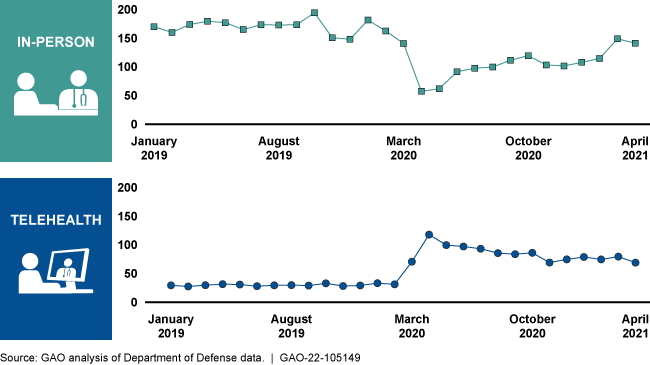Defense Health Care: DOD Expanded Telehealth for Mental Health Care during the COVID-19 Pandemic
Fast Facts
We reviewed mental health care for military servicemembers during the COVID-19 pandemic.
Telehealth visits made up about 15% of outpatient mental health visits before the pandemic (from Jan. 2019 through Feb. 2020). This type of visit increased 275% from Feb. 2020 to a peak in April 2020 of 118,246 visits. These visits have decreased since but remained above pre-pandemic levels.
Starting early in the pandemic, DOD shared information with mental health providers and servicemembers to help them cope with potential pandemic mental health impacts. This included information on helping prevent provider burnout and reducing stress on servicemembers.
In-Person and Telehealth Outpatient Mental Health Visits for Active Duty Servicemembers, 2019-April 2021 (in thousands)

Highlights
What GAO Found
The Department of Defense's (DOD) Military Health System provides a full range of medical care, including mental health care for conditions like anxiety and depression to servicemembers in the military services (Army, Navy, Air Force, and Marine Corps). DOD significantly increased its use of telehealth to provide mental health care to servicemembers during the COVID-19 pandemic. DOD data show that prior to the pandemic, from January 2019 through February 2020, telehealth visits represented about 15 percent of total outpatient mental health care visits. The number of these types of visits increased 275 percent from February 2020 to its peak in April 2020 (rising from 31,504 visits in February 2020 to 118,246 visits in April 2020). The utilization of outpatient mental health care through telehealth then decreased. However, it remained above pre-pandemic levels, accounting for 33 percent of all outpatient mental health care visits provided in April 2021.
DOD officials told us that telehealth was a valuable tool in providing mental health care during the COVID-19 pandemic, noting that telehealth facilitated continuity of care. DOD released guidance that allowed the use of programs such as Apple FaceTime and Microsoft Skype for DOD providers and servicemembers to engage in telehealth visits. DOD officials noted that telehealth may not be the best fit for some high-risk patients, but they said it is a valuable tool that will likely remain in use for some mental health care services after the pandemic recedes.
DOD shared information to help cope with potential mental health impacts of the COVID-19 pandemic with its mental health providers and servicemembers. This included information on providing care via telehealth and tip sheets for providers, resources for servicemembers on topics like stress reduction, wellness promotion, and coping with isolation, and materials from DOD research entities. For example, an Army official told GAO that the Army created and disseminated newsletters to mental health providers, addressing mental health related topics like how providers can help their patients mitigate domestic violence during the pandemic.
Why GAO Did This Study
The COVID-19 pandemic presented stressors for both members of the military services and military mental health providers; for some servicemembers, it meant deployment to the front lines of fighting the pandemic.
The William M. (Mac) Thornberry National Defense Authorization Act for Fiscal Year 2021 includes a provision for GAO to review mental health care for servicemembers during the COVID-19 pandemic. This report describes 1) what DOD did to provide mental health care during the COVID-19 pandemic, and 2) the information DOD shared with mental health providers and servicemembers to help them cope with the potential mental health impacts of the COVID-19 pandemic.
GAO examined DOD policies on mental health screening and on the provision of telehealth, reviewed reports about mental health care during the COVID-19 pandemic, analyzed data from the Defense Health Agency on the utilization of telehealth for mental health care services between January 2019 and April 2021 (the most recent data available at the time of our review), and interviewed DOD officials from the Defense Health Agency, the military services, and the National Guard.
For more information, contact Alyssa M. Hundrup at (202) 512-7114 or HundrupA@gao.gov.
